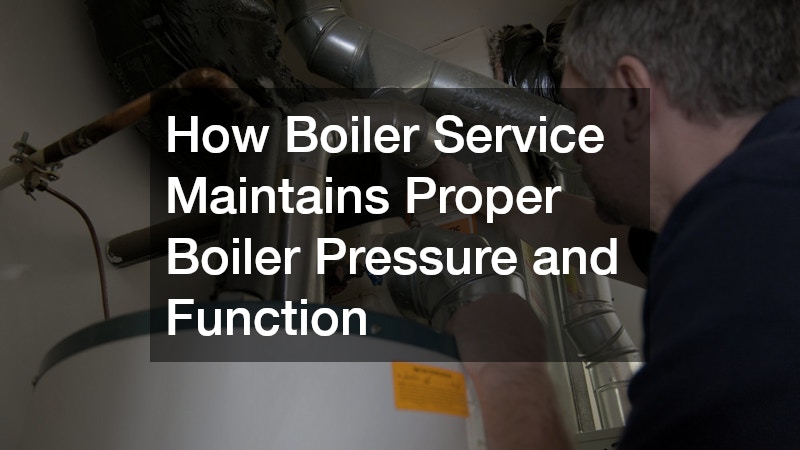In this article, we will explore the importance of boiler service and how it is essential in maintaining proper boiler pressure and functionality. Regular maintenance can prevent costly repairs and ensure safety and efficiency. Boilers are vital components in many homes and industries, providing heating and hot water.
However, their efficiency can be compromised by neglecting servicing and maintenance, leading to serious issues.
A well-functioning boiler can significantly improve energy efficiency, thereby minimizing utility costs and reducing environmental impact. However, over time, wear and tear can affect the boiler’s performance, leading to variations in pressure and functionality. In addition to saving money, proper maintenance directly correlates with safety, preventing potential hazards such as leaks and malfunctions.
In the following sections, we will delve into specific aspects of boiler service, focusing on the indicators that suggest low pressure, the benefits of regular servicing, the risks of neglect, and optimal times for scheduling maintenance. Understanding these components will empower homeowners and property managers to take proactive measures in ensuring their boilers operate smoothly.
What Are the Signs of Low Boiler Pressure?
Low boiler pressure is a critical issue that can affect overall heating performance. Users may notice inadequate heating, with rooms taking longer to warm up or remaining cold. Additionally, the boiler may start making unusual noises, indicating that it’s struggling to operate effectively due to low pressure.
One key sign of low pressure is the pressure gauge reading below the recommended level, typically between 1 and 1.5 bar for most domestic systems. Furthermore, other symptoms might include frequent error messages on digital displays or the activation of safety mechanisms designed to prevent further operation until the pressure issue is rectified.
Addressing these symptoms promptly is crucial, as they can escalate into more severe problems affecting not just the boiler but also the entire heating system. Timely intervention is fundamental in restoring pressure and maximizing the lifespan of the unit.
How Does Regular Boiler Service Prevent Pressure Issues?
Regular boiler service is pivotal in maintaining optimal pressure and overall functionality of the unit. During service, technicians conduct a thorough inspection, identifying any preliminary signs of pressure loss or malfunction. By addressing such issues early, they can help prevent more extensive damage that may lead to increased operational costs.
The servicing process often includes checking and adjusting pressure levels, ensuring that the expansion vessel, pressure relief valve, and other critical components are functioning correctly. Adjustments in these areas help maintain the ideal pressure range necessary for efficient operation.
Routine maintenance also focuses on flushing the system to remove any debris or scale buildup that could affect pressure levels. This proactive approach enables the boiler to run more efficiently, which can lead to lower energy bills and reduced wear and tear on the appliance.
What Are the Consequences of Neglecting Boiler Maintenance?
Failing to service a boiler regularly can lead to multiple dire consequences, starting with not maintaining proper pressure. This can result in suboptimal heating performance and increased energy usage as the boiler works harder to compensate for the inefficiency. Over time, this strain can contribute to premature wear and failure.
Moreover, neglected maintenance can lead to dangerous situations, such as gas leaks or carbon monoxide emissions, which pose serious risks to health and safety. Regular boiler servicing helps to identify potential hazards before they escalate, ensuring that all safety mechanisms are in place and functioning well.
When Should You Schedule Your Boiler Service?
Most experts recommend scheduling boiler service annually, with specific timeframes depending on your boiler’s age, usage, and type. For instance, newer boilers may require less frequent servicing, while older models, which may be more prone to issues, should receive more regular attention. Enhancing your understanding of the recommended service cycle can help you strike a balance between preventative maintenance and cost-effectiveness.
Additionally, specific factors may dictate varying maintenance schedules, such as whether the boiler operates under heavier loads during colder months, leading to increased wear. Monitoring pressure levels throughout the heating season becomes increasingly important, as fluctuations may suggest the need for earlier intervention.
Seasonal checks right before winter can ensure the boiler is ready for the demands of the colder months ahead. Scheduling your service during a time when the boiler is less likely to be in constant use also minimizes inconvenience and ensures that any necessary repairs can be conducted without delay.
Understanding the importance of boiler service in maintaining proper pressure and function can lead to a safer and more efficient heating system. Regular maintenance is key to avoiding issues and extending the lifespan of your boiler. By recognizing signs of trouble, acknowledging the need for preventative practices, and adhering to maintenance schedules, homeowners can ensure their heating systems operate smoothly and effectively.
A well-maintained boiler not only ensures comfort and warmth during the colder months but also significantly reduces energy costs and environmental impact. Prioritizing regular service fosters a proactive approach to home maintenance, securing the investment made in the boiler and supporting a dependable heating system.
Ultimately, the peace of mind that comes from knowing your boiler is in optimal condition is invaluable. Fostering a relationship with a qualified service provider can lead to better outcomes and a more efficient heating solution overall.



